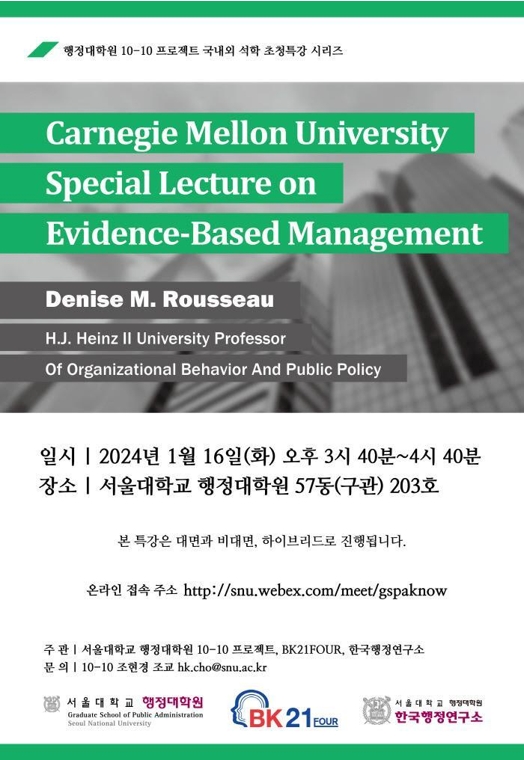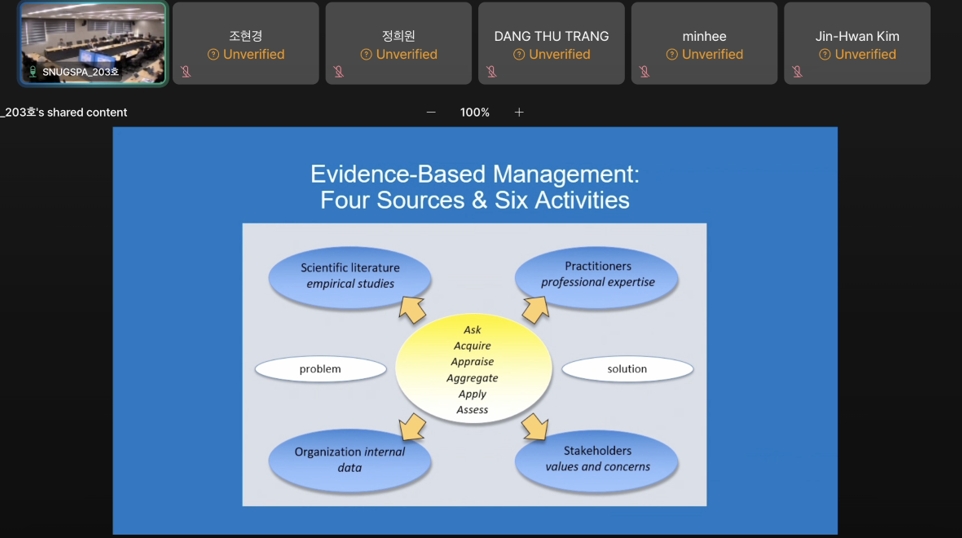
The Special Lecture on Evidence-Based Management by Professor Denise M. Rousseau
On January 16th, the Graduate School of Public Administration invited Professor Denise M. Rousseau of Carnegie Mellon University to give a special lecture on Evidence-Based Management. The lecture was conducted as part of SNU’s 10-10 Project, which aims to provide focused support for selected academic disciplines to develop their research capabilities, open to students studying at all levels from undergraduate to graduate. The lecture allowed interested students to learn more profoundly about evidence-based management and become acquainted with studies concerning its implementation in organizations.
Rousseau started the lecture by introducing the concept of evidence-based management. The idea of evidence-based management first arose in response to the observation that many organizations, including government entities and businesses, were not using and benefitting from the available scientific evidence. Researchers discovered that although related scientific evidence was abundant, the lack of work culture developed around using such evidence led to managers not using them as a reference when making decisions. Instead, managers were often seen resorting to relying on intuition and prior experience. Rousseau explained how this recognition of the problem led a group of researchers, including herself, to train students to better use the available data, hopefully leading organizations to make better decisions.
After briefly explaining the components and processes involved in evidence-based management, Rousseau shared with the audience her recent study investigating the implementation of evidence-based management in organizations. The study aimed to examine how evidence-based management was being implemented in organizations, exploring whether all the steps involved in the practice were followed and what the outcomes were for the organizations that employed it. Being a systematic review, her research is still ongoing. She emphasized, however, that the current trend, as reflected in the study results so far, is promising in that the positive outcomes thus far may attract more organizations to use evidence-based management.

Evidence-based Management: Four Sources & Six Activities
The first part of the study aimed to identify whether companies were properly implementing evidence-based management practices. Effective and proper evidence-based management consists of using four sources (scientific, contextual, practitioner’s expertise, stakeholders’ values and preferences) and following six processes: identifying the problem, acquiring the evidence regarding the problem and its possible solutions, appraising and filtering the acquired evidence, aggregating the filtered evidence to make a decision, making the decision, and assessing the results of the decision. Upon investigating the sources consulted by different organizations following evidence-based management, her study found that although most consulted scientific evidence, only 10% of the companies investigated acquired evidence from all four sources before making a decision. Evaluating the study results, Rousseau highlighted how despite scientific evidence being important, consulting just that would not outline the complete picture of the problem. She emphasized that the key to evidence-based management was not the amount of information consulted but rather the variety of information referenced. Accordingly, Rousseau stressed how companies should aim to build the capacity to reference multiple sources to better understand their problem and correct any biases they may have regarding it.
Similar patterns of overly focusing on a single component were also found when reviewing the processes companies follow in evidence-based management. Only 7% of the organizations studied followed all six processes of evidence-based management, and most companies focused on acquiring evidence. She acknowledged that acquiring information may be the hardest to build capacity on out of the six processes. She also stressed, however, that the most essential step that more organizations should aim to focus on is the final step of assessing their decisions as it is only through measuring the outcomes of the decision that companies can identify whether their management has worked and further develop their capabilities for the future.
After reviewing the current implementation of evidence-based management in companies, Rousseau shared with the audience the study results evaluating the effects of evidence-based management in organizations. Overall, implementing evidence-based management proved to positively impact both the individuals in the organization and the organization. For individuals, employing evidence-based management practices improved their confidence regarding their decisions as they became more certain that their decision was the best they could have made after consulting evidence. They developed a perception that because they had consulted evidence, their process was more fair. In terms of the organization, many organizations saw improved efficiency after following evidence-based management processes because the employees developed a better understanding of who to consult for various parts of the work, as well as a better understanding of the problem they are trying to solve. The improved confidence of the individuals as a result of implementing evidence-based management also elevated the efficiency of the organizations as the members became more committed to the work they were doing.
Rousseau’s lecture was an opportunity for students studying public administration and management to gain insight into the mechanisms and current status of one rising management practice. She concluded by accentuating the importance of staying updated on the implementation cases of management practices to identify areas of development and encouraged students to investigate the real-life instances of their theories.
Written by Yeryoung Lee, SNU English Editor, yeryounglee@snu.ac.kr

